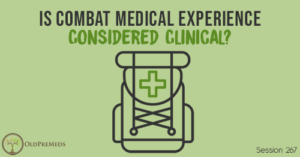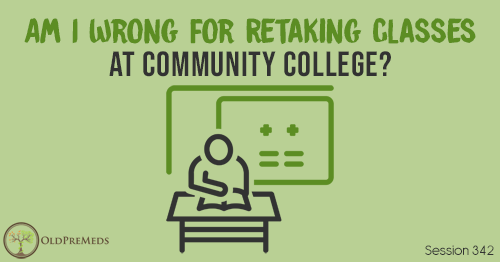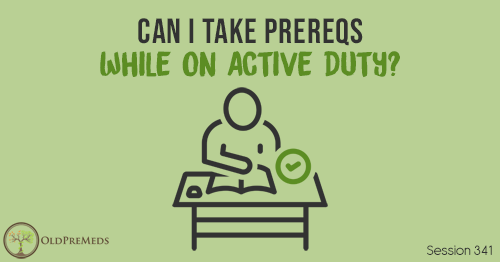Apple Podcast | Google Podcast
Session 267
How do you “translate” your work experience into your application so you can “stand out” as an applicant? Today, let’s talk about how you need to tell your story to medical schools.
Questions answered here on the podcast are taken directly from the Nontrad Premed Forum over at premedforums.com. Please go ahead and register for an account, ask your question, and have fun with the community.
This podcast is sponsored by Blueprint MCAT Prep. Also, please be sure to check out all our other podcasts on Meded Media as we try to bring you as many resources as you need on this journey.
Listen to this podcast episode with the player above, or keep reading for the highlights and takeaway points.
[01:05] OldPreMeds Question of the Week
“I am a current pre-med student with 10 years of Special Operations experience in the military. During my time on deployments, I participated in a lot of real-world medical situations (everything from combat trauma, to health clinics…etc).
Does this experience count as clinical experience in the eyes of medical school? If so, what is the best/appropriate way to translate these experiences into the medical school application?”
[01:34] Translating Into Your Application
That’s an amazing clinical experience, which is something many students are not going to have. It’s definitely an experience that you will be able to talk about in your application.
“When it comes to translating this into your application, don't do that. Just tell the story of what you did without translating it to how this is going to help you as a physician.”Click To TweetYou don’t need to translate combat medical experience into how it has prepared you to be a physician. Most people reading an application will understand that such experience is very valuable to who you are. It’s what solidified your mind that you want to be a healthcare provider. And that obviously something in there motivated you to do that. And that’s the story that you need to tell on your application.
And so, talk about how it was motivating you to become a physician, not translating it into why you think it’s going to help you to be a physician.
[04:37] Don’t Sell Your Story
“The goal of the application, your personal statement, your extracurricular descriptions, and your secondary essays, is to paint a picture of who you are and what you've done.”Click To TweetDo not sell a story about why you are ready to be a physician or why you think you’re going to be a great physician. Every student can say that, but it doesn’t mean anything. What’s unique to you is your story and why it’s motivating you.
So don’t worry about translating what your experiences were into why you think it’s going to make you a good physician. Worry about telling the story about what happened. Get nitty-gritty into one specific experience, out of the many that you’ve had, paint that picture, and then tell the reader why it’s motivating you to be a physician. That’s the connection that you should have.
[05:45] Let Blueprint Help You with Your MCAT Journey
If you’re a premed, and you are on your journey to medical school, the MCAT is something that students have to combat all of the time. Speaking of some combat experience, the MCAT is obviously a beast. It’s hard – and it’s important.
Blueprint MCAT Prep is there to help you with free resources. One of those free resources is the podcast that I do with them called The MCAT Podcast.












